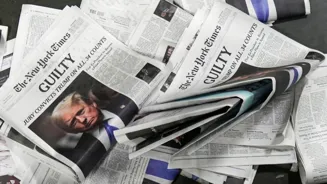The case, announced on Monday, will be filed in Florida and centres on allegations of defamation and libel. Trump claims the paper has engaged in years of false reporting intended to harm his reputation, his family, and his businesses.
The latest legal fight follows a NYT report linking Trump to a controversial handwritten note and suggestive drawing given to disgraced financier Jeffrey Epstein on his 50th birthday in 2003.
The document appeared to carry Trump’s signature, but both the US president and his aides have rejected any connection to the item, calling it fabricated.
Trump’s planned lawsuit is the latest in a series of legal offensives targeting powerful media organisations.
Over the last several years, he has pursued multiple lawsuits—some successful, others dismissed — as part of what he calls a campaign to “restore integrity to journalism.”
What are Trump’s accusations against NYT?
Trump unveiled the lawsuit on Truth Social, his social media platform, in a late-night post. In the message, he sharply criticised the news outlet for what he sees as a deliberate effort to mislead the public.
“Today, I have the Great Honor of bringing a $15 Billion Dollar Defamation and Libel Lawsuit against The New York Times,” Trump wrote. “The New York Times has been allowed to freely lie, smear, and defame me for far too long, and that stops, NOW!”
He also condemned the newspaper’s decision to endorse Kamala Harris during the 2024 US presidential election, which he won.
Trump expressed outrage that the endorsement appeared prominently on the paper’s front page, writing: “Their Endorsement of Kamala Harris was actually put dead center on the front page of The New York Times, something heretofore UNHEARD OF!”
According to Trump, the lawsuit will be filed in Florida, a state where he enjoys strong political support. He has previously filed lawsuits in Florida courts against other major media outlets, including ABC News and CBS.
While Trump’s announcement did not detail the precise legal arguments, he accused NYT of systematically producing falsehoods and serving as “a mouthpiece for the Radical Left Democrat Party.”
He also claimed that media organisations use “a highly sophisticated system of document and visual alteration” to misrepresent facts and smear him, though he did not provide evidence for this allegation.
Trump has previously criticised media outlets for reporting on his past interactions with Epstein, who died in prison in 2019 while facing sex trafficking charges.
Earlier this year, Trump also sued The Wall Street Journal and Rupert Murdoch for $10 billion, alleging defamation over a separate story about his ties to Epstein. That case remains ongoing.
How have other lawsuits by Trump against media outlets fared?
Over the past few years, Trump has filed multiple lawsuits against major networks and publications. Some cases have resulted in settlements, while others were dismissed by courts.
ABC News: One of Trump’s most notable legal victories came in December 2024, when ABC News reached a settlement over remarks made by anchor George Stephanopoulos.
During a broadcast, Stephanopoulos stated that Trump had been found liable for “rape.”
In reality, a civil jury had ruled that Trump was liable for defamation and sexual abuse — but not rape, which is treated as a separate crime under New York law.
The lawsuit, filed earlier in 2024, accused Stephanopoulos and the network of spreading false information that damaged Trump’s reputation during the campaign.
As part of the settlement, ABC News agreed to contribute $15 million to Trump’s presidential library and issued a public statement expressing regret for the inaccurate comment.
CBS News : In October 2024, Trump targeted CBS, accusing the network of deliberately editing an interview with Kamala Harris to create the appearance of conflicting answers about the Israel-Hamas conflict. A
ccording to the lawsuit, CBS broadcast two different versions of the same interview question, which Trump claimed confused and misled millions of viewers.
The suit, filed in Texas, alleged that the editing violated the Texas Deceptive Trade Practices-Consumer Protection Act, which prohibits misleading business practices.
CBS rejected the allegations, calling the case “meritless.”
In December 2024, the network filed a motion seeking to dismiss the lawsuit or move it to New York, arguing that Texas lacked jurisdiction.
Des Moines Register: In December 2024, Trump also sued the Des Moines Register, its parent company Gannett, and pollster J Ann Selzer over a poll conducted ahead of the November 2024 election.
The poll showed Kamala Harris leading Trump by three percentage points in Iowa, a state he ultimately won.
Trump claimed the poll was manipulated to create a false narrative of Democratic momentum and was leaked to Democratic operatives before publication.
A spokesperson for the newspaper acknowledged that the poll did not match the final results but defended the integrity of its reporting.
Trump’s lawsuit seeks damages and a court order requiring the defendants to disclose all internal communications related to the poll and prevent future “deceptive and misleading acts.”
CNN News: In 2023, a federal judge dismissed Trump’s $475 million lawsuit against CNN, which accused the network of defamation for repeatedly using the term “the big lie” to describe his false claims about the 2020 election and for comparing him to Adolf Hitler.
Trump’s lawyers argued that CNN’s coverage was designed to “aggravate, scare, and trigger people.”
However, US District Judge Raag Singhal ruled that the statements were opinions protected under the First Amendment.
“Being ‘Hitler-like’ is not a verifiable statement of fact that would support a defamation claim,” the judge wrote in his decision, ending the case in CNN’s favour.
NYT in 2021: In 2021, Trump filed a $100 million lawsuit against The New York Times and his niece Mary Trump, alleging that they conspired to unlawfully obtain his tax records for a series of investigative reports.
The series, which later won a Pulitzer Prize, revealed extensive details about Trump’s finances and tax strategies. Trump’s lawsuit claimed there was “an insidious plot” to harm him politically and financially.
In 2023, a judge dismissed the case, stating that Trump’s arguments were legally insufficient and that the publication of the tax records was protected under constitutional principles of free speech and press freedom.
Bob Woodward and “The Trump Tapes”: Trump also engaged in a protracted legal battle with renowned journalist Bob Woodward, who interviewed him extensively during his first term.
The interviews formed the basis for Woodward’s 2021 book Rage and the subsequent audiobook The Trump Tapes.
In January 2023, Trump sued Woodward and publisher Simon & Schuster, claiming that the recordings were created exclusively for one book and that their use in other formats violated copyright law.
Trump alleged that the publisher engaged in “systematic usurpation, manipulation, and exploitation” of his recorded words.
Woodward and the publisher rejected Trump’s claims, insisting that the interviews were on-the-record and conducted with his consent.
In July 2025, a federal judge dismissed the lawsuit, ruling that Trump had not demonstrated joint authorship or any valid copyright interest.
However, the judge allowed Trump to file an amended complaint, though he noted it was “unlikely” that Trump could succeed in establishing a plausible claim.
What is behind Trump's "fight" against US media outlets?
Trump has framed his ongoing legal battles as part of a larger mission to challenge what he sees as entrenched media bias. By filing lawsuits against major networks, newspapers, and journalists, he has sought to position himself as a defender of truth and accountability.
In his Truth Social posts, Trump has accused several outlets of deliberately distorting coverage through advanced technological manipulation.
While he has provided no specific evidence, his statements resonate with his supporters, many of whom believe mainstream media outlets are working against his administration.
These lawsuits also serve as a political tool, allowing Trump to highlight perceived double standards and rally his base ahead of the 2028 election cycle.
Legal analysts expect the NYT defamation case to face significant hurdles given the high burden of proof required in defamation cases involving public figures.
NYT has not yet issued a detailed public response to Trump’s latest claims. In past disputes, the paper has consistently defended its reporting as accurate and protected under the First Amendment.
As the case moves forward, it will join a crowded docket of ongoing litigation involving Trump, including his unresolved cases against The Wall Street Journal.
With inputs from agencies













